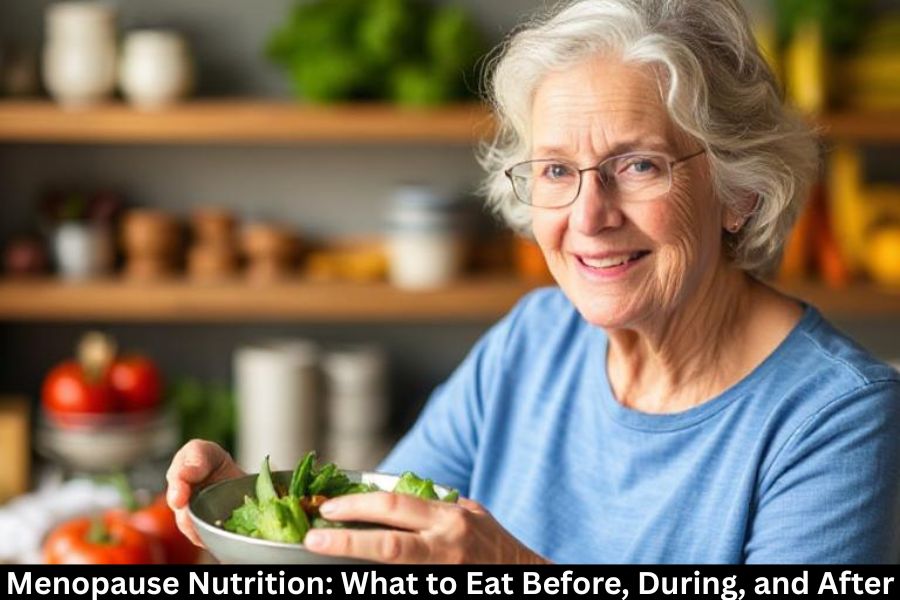Menopause is one of the biggest transitions in a woman’s life—physically, emotionally, and hormonally. And while you can’t stop the natural changes happening inside your body, you can support your health with the right nutrition. What you eat before, during, and after menopause has the power to reduce symptoms, balance your moods, protect your bones, and keep your energy levels steady.
Let’s dive into what your body needs at each stage—and how simple dietary changes can genuinely transform the way you feel.
Understanding Menopause and Its Nutritional Needs
What Happens to Your Body During Menopause
During menopause, estrogen levels drop, which affects almost everything: mood, metabolism, bone density, and even sleep quality.
Why Nutrition Plays a Major Role
Food becomes a tool—one that helps regulate hormones, fight inflammation, support bones, and fuel your body through changes.
Key Hormonal Changes to Consider
Estrogen and progesterone fluctuate, which can cause hot flashes, fatigue, mood swings, and weight changes.
Nutrition Before Menopause (Perimenopause)
Preparing Your Body for Hormonal Shifts
Perimenopause can start years before menopause. It’s the perfect time to strengthen your health habits.
Foods to Support Mood and Energy
Whole grains, leafy greens, berries, and nuts help stabilize energy and mood.
Boosting Nutrients That Decline With Age
Calcium and Bone Health
Bone density begins dropping even before menopause—calcium-rich foods like yogurt, almonds, and tofu help.
Iron and Energy Levels
Women approaching menopause often experience low iron. Spinach, lentils, and fortified cereals can help maintain healthy levels.
Essential Nutrients Before Menopause
Omega-3 Fatty Acids
Found in salmon, walnuts, and chia seeds, omega-3s help balance mood and reduce inflammation.
Fiber for Digestive Health
Fiber-rich foods like oats, beans, and fruits help regulate hormones and digestion.
Antioxidants and Inflammation Protection
Berries, dark chocolate, and green tea protect cells and help reduce oxidative stress.
What to Eat During Menopause
Managing Hot Flashes Through Diet
Foods like spicy sauces, alcohol, processed meats, and caffeine can worsen hot flashes—avoid or limit them.
Balancing Blood Sugar for Hormonal Stability
Balanced meals (protein + fiber + healthy fat) help reduce mood swings and energy dips.
Hydration and Electrolytes
Best Hydrating Foods
Cucumbers, citrus fruits, melons, and coconut water keep you hydrated.
Avoiding Dehydrating Triggers
Too much caffeine or alcohol can worsen dryness and night sweats.
Key Nutrients During Menopause
Vitamin D for Bone Strength
Vitamin D helps your body absorb calcium. Fatty fish, fortified milk, and sunshine are your best sources.
Phytoestrogens and Their Benefits
Foods like soy, flaxseeds, and chickpeas mimic estrogen gently—helping ease symptoms.
Protein for Muscle Maintenance
Muscle mass naturally decreases during menopause. Lean meats, beans, eggs, and tofu are essential.
Foods to Limit or Avoid During Menopause
Caffeine and Hot Flash Triggers
Caffeine affects temperature regulation and may worsen sleep.
Highly Processed Foods
These spike blood sugar levels and increase inflammation.
Sugary Drinks and Blood Sugar Spikes
They cause rapid crashes—leading to mood swings and cravings.
Nutrition After Menopause
Maintaining Bone Density
Low estrogen increases the risk of osteoporosis. Calcium, vitamin D, and magnesium become crucial.
Supporting Heart Health
Heart protection becomes more important. Omega-3 fats and whole grains help lower cholesterol.
Preventing Weight Gain
Metabolism slows after menopause—but smart eating and movement can help maintain a healthy weight.
Best Foods After Menopause
Lean Proteins
Chicken, turkey, beans, and tofu help maintain strength.
Whole Grains
Quinoa, barley, and oats help digestion and keep blood sugar stable.
Healthy Fats
Nuts and Seeds
Flax, chia, almonds, and walnuts support brain and heart health.
Olive Oil and Avocado
Healthy fats that fight inflammation and support hormone balance.
Lifestyle Tips to Complement Nutrition
Regular Exercise
Strength training protects muscles and bones. Walking and yoga improve balance and stress.
Mindful Eating Techniques
Eat slowly, savor each bite, and tune into hunger cues.
Prioritizing Sleep and Stress Reduction
Meditation, magnesium-rich foods, and consistent sleep routines help stabilize hormones.
Building a Long-Term Menopause-Friendly Meal Plan
Sample Daily Menu
- Breakfast: Greek yogurt, berries, and chia seeds
- Lunch: Quinoa bowl with veggies and grilled chicken
- Snack: Almonds + green tea
- Dinner: Salmon, roasted vegetables, and brown rice
Simple Grocery List
Leafy greens, whole grains, nuts, legumes, yogurt, tofu, berries, olive oil.
Easy Meal Prep Ideas
Roast big batches of vegetables, cook grains ahead, and keep chopped fruit handy.
Common Myths About Menopause Nutrition
Myth: Menopause Automatically Causes Weight Gain
Weight gain is possible—but diet, sleep, and activity make a big difference.
Myth: Supplements Replace a Healthy Diet
Supplements help, but real food is the foundation.
Myth: Low-Fat Eating Is Always Better
Healthy fats are essential during and after menopause.
Final Thoughts on Menopause Nutrition
Menopause doesn’t have to feel like an uphill battle. With the right nutrition choices, you can support your hormones, protect your bones, boost your energy, and feel your best—before, during, and long after menopause. Small daily steps lead to long-term well-being.
FAQs
1. What food helps most with hot flashes?
Soy, flaxseeds, and cooling foods like cucumbers can help reduce symptoms.
2. Should I take supplements during menopause?
Supplements may help, but it’s best to focus on whole foods first and consult a healthcare provider for personal needs.
3. Why is protein important during menopause?
It helps prevent muscle loss and supports metabolism.
4. Can hydration reduce menopause symptoms?
Yes—staying hydrated can lessen hot flashes and improve skin dryness.
5. Do phytoestrogens really help?
Many women find relief from mild symptoms when including foods like soy and flax.

